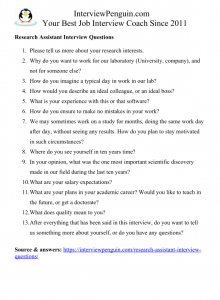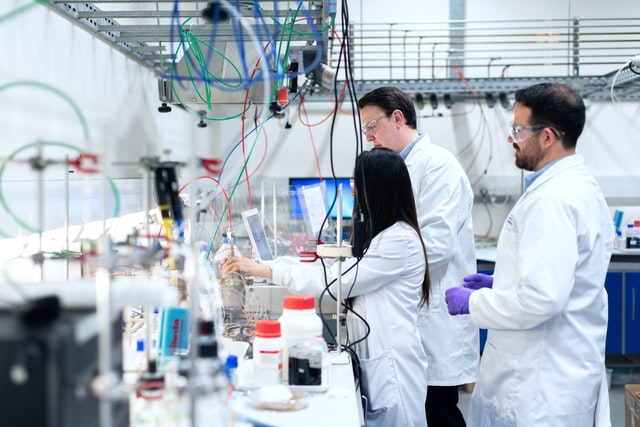Each scientific breakthrough and each innovation was once just a dream born in a lab, in a mind of an ambitious researcher. Lot of hard work typically follows such dreams, months or even years of experiments, analyses, making new hypotheses and dashing the old ones. The circle can repeat a hundred times.
Research Assistant is a fascinating and well paid job. You can become famous one day, perhaps win a Nobel prize, or at least participate in an important discovery that will have wide implications in the world. But it’s more an effort than results what counts. At least for each true researcher. As long as you enjoy the process, and create something, you are successful…
Let’s have a look at some questions you may face while interviewing for this job.
Table of Contents
Please tell us more about your research interests.
You should try to find some intersection of your and their interests. Learn something about their lab, what they are working on, at least generally. You should check the publications of their lead researchers–read the abstract of each paper, to know what it is about.
If one of the fields interests you greatly, try to think about some innovation, or about a way in which you can participate on their research. And read that one paper properly, from start to finish. It will not only help you to find a good answer to this question–identifying the research interests you should talk about, but also to connect with the interviewers.
More often than not, a scientist or an academic will lead an interview with you. These people love to talk about their own work. Seeing that you read their publications, and perhpas can offer some valuable comment on it, you can easily win their favor.
Why do you want to work for our laboratory (University, company), and not for someone else?
You have a few options for a good answer. First one is praising their place. As a researcher, you want to work with quality people and have modern equipment on your disposal. Since their lab has a great reputation and offers all tools you may need in your research work (or while assisting with one), it is your first choice.
Second option is referring to people working there already. Say that you admire the work of a certain researcher or professor, and would love to work under their supervision. You read their papers, and would love to assist them in their research. Seeing there’s an intersection of your and their research interests, you find it a perfect match.
Third alternative consists in referring to practical reasons. Maybe you do not want to relocate and the lab is located in your city. Or you have some teaching commitments at the uni and it would be ideal to combine it with research work at the same place…
* May also interest you: Why did you choose this university?
How do you imagine a typical day in work in our lab?
The most important thing is to not get carried away with your answer. You will certainly get a chance to bring new ideas onboard and to test your own hypotheses, but at the moment you are applying for a job of an assistant.
Talk about collecting data, doing analyses and forecasts, and carrying out experiments, following the directions of the lead researcher. You can say that you expect to work a lot in front of a computer, but perhaps also in the field, outside of the lab, if they need to collect some data for the experiments.
Ensure your interviewers that you understand the scope of your job. You have your ambition, but do not expect to lead the entire lab… You will assist other researchers with their work.
How would you describe an ideal colleague, or an ideal boss?
Scientists and researchers often have tricky personalities. Some are consumed by their work, and some by their ego… That’s the reason why you may get this question in your research assistant interview–they want to know your expectations.
I suggest you to say that you do not expect much from your superior, or colleagues. Of course they should give you a chance, and provide clear instructions about your job, and you hope that they will be receptive to your feedback and ideas.
At the same time, however, you understand that you will be the new force in an office. You do not expect everyone to change to fit your idea of a perfect collective or workplace. You will try to adapt, and fit into the existing team. Hence you do not have your idea of an ideal colleague, but you will try to become a great colleague.
* May also interest you: Lab Assistant interview questions.
What is your experience with this or that software?
They may ask about some software for statistical analysis, or even about something special, some niche product they use in their lab. Now you can find yourself in two positions: Either you have the experience, or you have no idea what program they are talking about.
When you have experience, just describe how long you’ve been working with the software, the principal modules of functionality you used.
If you do not have experience, you should try to convince them of your motivation to learn, and excellent computer skills. You’ve worked with many different software packages before, and you always managed to learn your way around it rather quickly. Can’t see a reason why it should be otherwise in this case.
How do you ensure to make no mistakes in your work?
Everyone makes mistakes. Some of the greatest scientific discoveries were a result of a mistake. However, you should try to convince them that you do your best to minimize the number of mistakes.
First and foremost, tell them about your attention to detail and concentration. You neither check your Facebook feed while working in the lab, nor think about the party you’d attend in the evening. You love your job and always focus at the task at hand, and you follow all regulations and safety protocols to the point.
What’s more, you double check most things (or perhaps everything), and prefer if there is a system of control in place in the lab (s software warns you about some outliers, or another colleague checks the work after you). If they do not have such a system in place, you may design one together… For more inspiration, you can check 7 sample answers to “How do you ensure accuracy in your work?”
We may sometimes work on a study for months, doing the same work day after day, without seeing any results. How do you plan to stay motivated in such circumstances?
Ensure them that you understand the daily bread of researchers. You do not expect to win a Nobel prize after first two years in an office. No results are guaranteed in scientific experiments. The lab may spend all resources (both financial and material) and end up empty-handed.
But as long as you have a goal in your mind, as long as you follow certain aims with your experiments, the research makes sense, and is not a waste of time–even if you come to no viable conclusions.
This is your mindset, the way you see the job, and with such a mindset you do not mind repeating the same experiments day after day, recording the same results, taking care of the same tasks. Ensure the interviewers that you won’t lose your motivation easily.
Other questions you may face in your research assistant job interview
- Where do you see yourself in ten years time?
- In your opinion, what was the one most important scientific discovery made in our field during the last ten years?
- What are your salary expectations?
- What are your plans in your academic career? Would you like to teach in the future, or get a doctorate?
- What does quality mean to you?
- What does integrity mean to you?
- Tell us about a time when you showed initiative at work.
- Describe a time when you achieved a goal and tell us how you did it.
- Tell us about a time when you felt overwhelmed with work.
- After everything that has been said in this interview, do you want to tell us something more about yourself, or do you have any questions?
* Special Tip: If you are not sure how to answer the questions from my list, or experience interview anxiety, have a look at our Interview Success Package. Up to 10 premium answers to basically all tricky questions you may face in your Research Assistant job interview will help you streamline your interview preparation, outclass your competitors, and eventually get the job. Thank you for checking it out!
Final thoughts
Interview for a job of a research assistant belongs to tricky interviews. It can be both easy and difficult, depending on the number of applicants and also the skills of your interviewers.
Sometimes when you manage to make a good connection with the primary researcher, for example by praising them for their latest publication and finding some intersections with your own research interests, they may hire you right away with no additional questions. The same can happen if they read some of your academic works and enjoyed what they read.
In other cases, however, you can face many questions, just like I described in this article. Questions about your goals, expectations, experience with some software or with different kind of research work, and attitude to some situations that can happen in a lab.
Try to prepare a short answer to each question, and do a good research about your future place of work and the leading researchers working there. That’s the most you can do to succeed in your interview. I wish you good luck!
Matthew
* You can also download the list of questions in a one page long PDF, print it, and practice your interview answers anytime later:

May also interest you:
- Lab Technician interview questions.
- Clinical Research Coordinator interview questions.
- Market Research Analyst interview questions.

